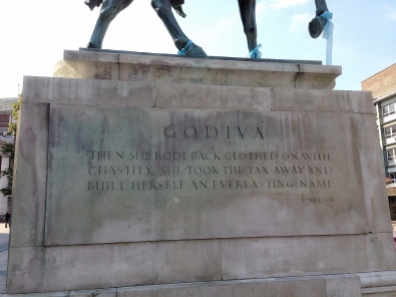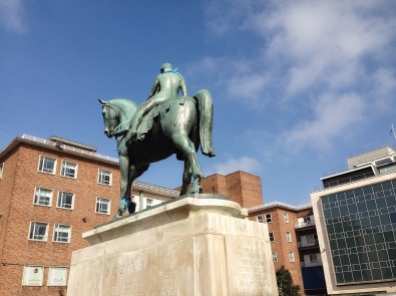Join Rebecca and Sarah as they discuss Alfred Tennyson’s “Lady Godiva” and the role that poetry can play in our lives today.

Coventry
Godiva
Alfred, Lord Tennyson (1809–1892)
I WAITED for the train at Coventry;
I hung with grooms and porters on the bridge,
To watch the three tall spires: and there I shaped
The city’s ancient legend into this:—
Not only we, the latest seed of Time,
New men, that in the flying of a wheel
Cry down the past; not only we, that prate
Of rights and wrongs, have loved the people well
And loathed to see them overtaxed; but she
Did more, and underwent, and overcame,
The woman of a thousand summers back,
Godiva, wife to that grim earl who ruled
In Coventry: for when he laid a tax
Upon his town, and all the mothers brought
Their children, clamoring, “If we pay, we starve!”
She sought her lord, and found him, where he strode
About the hall, among his dogs, alone,
His beard a foot before him, and his hair
A yard behind. She told him of their tears,
And prayed him, “If they pay this tax, they starve.”
Whereat he stared, replying, half amazed,
“You would not let your little finger ache
For such as these?”—“But I would die,” said she.
He laughed, and swore by Peter and by Paul;
Then filliped at the diamond in her ear,
“O, ay, ay, ay, you talk!”—“Alas!” she said,
“But prove me what it is I would not do.”
And from a heart as rough as Esau’s hand,
He answered, “Ride you naked through the town,
And I repeal it”; and nodding as in scorn,
He parted, with great strides, among his dogs!
So left alone, the passions of her mind,
As winds from all the compass shift and blow,
Made war upon each other for an hour,
Till pity won. She sent a herald forth,
And bade him cry, with sound of trumpet, all
The hard condition, but that she would loose
The people; therefore, as they loved her well,
From then till noon no foot should pace the street,
No eye look down, she passing, but that all
Should keep within, door shut and window barred.
Then fled she to her inmost bower, and there
Unclasped the wedded eagles of her belt,
The grim earl’s gift; but ever at a breath
She lingered, looking like a summer moon
Half-dipt in cloud: anon she shook her head,
And showered the rippled ringlets to her knee;
Unclad herself in haste; adown the stair
Stole on; and, like a creeping sunbeam, slid
From pillar unto pillar, until she reached
The gateway; there she found her palfrey trapt
In purple blazoned with armorial gold.
Then she rode forth, clothed on with chastity:
The deep air listened round her as she rode,
And all the low wind hardly breathed for fear.
The little wide-mouthed heads upon the spout
Had cunning eyes to see; the barking cur
Made her cheek flame; her palfrey’s footfall shot
Light horrors through her pulses; the blind walls
Were full of chinks and holes; and overhead
Fantastic gables, crowding, stared: but she
Not less through all bore up, till, last, she saw
The white-flowered elder-thicket from the field
Gleam through the Gothic archways in the wall.
Then she rode back, clothed on with chastity:
And one low churl, compact of thankless earth,
The fatal byword of all years to come,
Boring a little auger-hole in fear,
Peeped: but his eyes, before they had their will,
Were shrivelled into darkness in his head,
And dropt before him. So the Powers, who wait
On noble deeds, cancelled a sense misused;
And she, that knew not, passed: and all at once,
With twelve great shocks of sound, the shameless noon
Was clashed and hammered from a hundred towers,
One after one: but even then she gained
Her bower; whence re-issuing, robed and crowned,
To meet her lord, she took the tax away,
And built herself an everlasting name.





Wow, what a thought provoking conversation! Having grown up during decades of cartoon-like representations of this event, it’s now refreshing to learn the historical context…Tax collectors were dreaded and hated because they often padded their own pockets…Poetry as a force for change in many ways hearkens back to the medieval troubadours and minstrels whose recitation and song were the meaningful media of their time…I suspect that charity work may have been the domain of women, perhaps their only area of power…To surrender her modesty for cause must have been a difficult choice. Speaking of the power of choice, last night I read Denise Levertov’s absolutely stunning Annunciation. Levertov was herself a resistance poet. Here’s the best formatted version of this poem: https://sarahclarkson.com/thoroughly-alive/2017/11/17/annunciation-a-poem-and-a-holy-provocation
LikeLiked by 2 people
Thank you for the introduction to Sarah Clarkson – this is a wonderful place to stop by for reflection. I am delighted you enjoyed our discussion of Lady Godiva. I tried to find a recitation on line but could only find a robotic voice so I decided to do it myself. Once the words are in the air, they seem to call me back in time to another era.
LikeLiked by 1 person
I studied Levertov’s poetry in college, but I don’t remember reading “The Annunciation.” You’re right. It’s stunning. It’s one of those poems that makes me wonder how one human being could create something so beautiful and true and transcendent.
LikeLiked by 2 people
Ah, the power of poetry. I just read Levertov’s remarkable bio in Poetry Foundation.
LikeLiked by 2 people
I had the privilege of attending a reading of hers when she came to the University of New Hampshire while I was a grad student there.
LikeLiked by 2 people
How wonderful for you – a profound moment.
LikeLiked by 2 people
Although the setting was disconcerting. The reading was held in a lecture hall with sharply-banked seats, so we were all perched uncomfortably looking down at her. But it was a privilege to hear her read.
LikeLiked by 2 people
Yikes – I always envision poetry readings in a library setting with comfy chairs. But it would be a privilege to hear her read in any situation. What a memorable moment for you!!
LikeLiked by 2 people
Yes, it was.
LikeLiked by 2 people
I, too, enjoyed the discussion of the Lady Godiva story. I think my father may have read me Tennyson’s poem, but I didn’t remember it. Learning the details of what happened and the historical context for the event provided the poem with even more dimension. This line stands out as conveying the dismissiveness of her husband: “Then filliped at the diamond in her ear.” “Filliped” is the perfect word to convey his attitude at that point. I don’t think another word would have been as effective.
LikeLiked by 2 people
I have always loved Tennyson’s poem and am now on a second attempt at “The Lady of Shallott” recitation. I had to smile when Tennyson described Lady Godiva’s husband – always with his dogs. But what is perhaps overlooked is that he kept his word and honoured his promise. I thought that you would like this video by the “History Guy” on YouTube (hope the link works) for a historical perspective, which is always exciting: https://youtu.be/gOqJzcsXGvo
LikeLiked by 2 people
Thank you for sharing the video. The additional historical context was very interesting. (I did find the history fellow’s delivery rather tiring, however. 😉 )
LikeLiked by 2 people
This continuing conversation is wonderful as well. I’ve been following along and have just a few more comments. Liz, what an experience to hear Levertov recite her own poetry! (I’ve been reading in her collected poems and think the pieces that are separated collected in The Stream & The Sapphire are inspiring, beautiful, compassionate and mystical. And Rebecca, your interest in the historical context of the poem really highlights the importance of Godiva’s chosen resistance! The virtues exemplified in the poem/story have been lost in modern time’s silly and salacious obsessions. Compassion, trust, fidelity, the courage of Lady Godiva and the honor bound oath of her husband, the loathed tax collector, are worth our consideration. Here two people, one who paraded nearly naked and the other a despised powerful man, become legendary for their unexpected behaviors!
LikeLiked by 1 person
Oh, very very well said, Mary Jo! I marvel how narratives become legends that remain ingrained in the wider storyline. From the epic of Gilgamesh, to the romance of Romeo and Juliet, we see ourselves in new ways. One question that has been in my mind relates to how we can advocate, inspire a more thoughtful approach to working within a complex world.
LikeLiked by 1 person